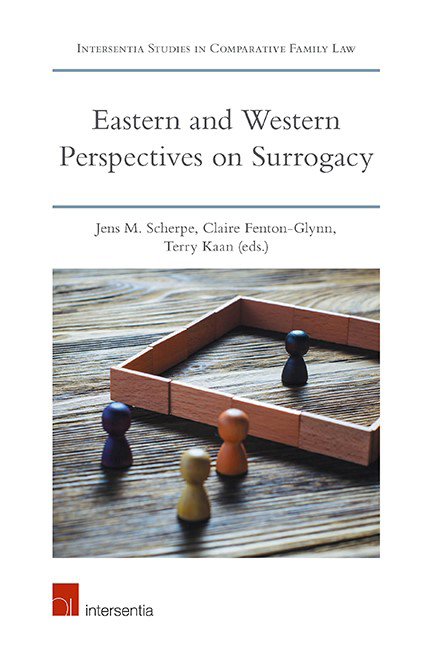Book contents
- Frontmatter
- Preface and Acknowledgements
- Contents
- List of Contributors
- Introduction
- Questionnaire
- PART I WESTERN PERSPECTIVES
- THE PROHIBITIVE APPROACH
- France
- Germany
- Germany: A Judicial Perspective
- Spain
- THE TOLERANT APPROACH
- THE REGULATORY APPROACH
- THE FREE MARKET APPROACH
- THE INFLUENCE OF INTERNATIONAL COURTS
- PART II EASTERN PERSPECTIVES
- THE PROHIBITIVE APPROACH
- A TOLERANT APPROACH?
- REGULATION THROUGH PROFESSIONAL MEDICAL BODIES
- FROM FREE MARKET TO REGULATION
- PART III COMPARATIVE PERSPECTIVES ON SURROGACY
- Index
- About the Editors
France
from THE PROHIBITIVE APPROACH
Published online by Cambridge University Press: 26 June 2019
- Frontmatter
- Preface and Acknowledgements
- Contents
- List of Contributors
- Introduction
- Questionnaire
- PART I WESTERN PERSPECTIVES
- THE PROHIBITIVE APPROACH
- France
- Germany
- Germany: A Judicial Perspective
- Spain
- THE TOLERANT APPROACH
- THE REGULATORY APPROACH
- THE FREE MARKET APPROACH
- THE INFLUENCE OF INTERNATIONAL COURTS
- PART II EASTERN PERSPECTIVES
- THE PROHIBITIVE APPROACH
- A TOLERANT APPROACH?
- REGULATION THROUGH PROFESSIONAL MEDICAL BODIES
- FROM FREE MARKET TO REGULATION
- PART III COMPARATIVE PERSPECTIVES ON SURROGACY
- Index
- About the Editors
Summary
GENERAL LEGAL FRAMEWORK
Surrogacy is forbidden in France without any distinction between altruistic or commercial surrogacy, between traditional or gestational surrogacy or between domestic and international surrogacy. When in the 1980s surrogacy became more popular, the legality of agencies and associations dealing with surrogacy was disputed. In 1988 the Conseild'É tat, the highest administrative court of France, confirmed a decision to deny legal registration of those bodies.
In the same year the French Supreme Court, the Cour de cassation, ruled that those associations were null and void because their object was illegal and that they had to be dissolved. In 1991 the Cour de cassation, sitting in plenary assembly, ruled in a domestic case that surrogacy agreements, even in noncommercial cases, violated public policy and were void because the human body, and the status of a person, could not be seen as commodities. They are both inviolable and inalienable. Changes in the civil status of a person may derive from events, the operation of law, judgments or administrative decisions but not from private arrangements. Furthermore, surrogacy was seen as an instrument to circumvent the adoption procedure. This case law was integrated in the Bioethics Act of 30 July 1994 and later codified in Art. 16-7 of the Civil Code. This article states that any surrogacy agreement is null and void. Such nullity is a matter of public policy (Art. 16-9 of the Civil Code). Since surrogacy agreements are illegal and contrary to public policy, they are not binding and not enforceable.
Today, the reasons behind this public policy principle still lie in the inalienability of the human body and the civil status of a person as argued by the Cour de cassation. The prohibition is also justified by ethical concerns. It seeks to avoid the situation that the child is treated as merchandise between infertile couples and surrogates. The prohibition aims also to protect the interest of the child which is seen as psychologically at risk in such transactions. The prohibition is also meant to prevent the exploitation of surrogates, as they are mostly from a lower economic status than the commissioning parents. This approach was until recently supported by a majority of the French population. But a recent poll of December 2017 shows that society is changing.
- Type
- Chapter
- Information
- Eastern and Western Perspectives on Surrogacy , pp. 17 - 34Publisher: IntersentiaPrint publication year: 2019



